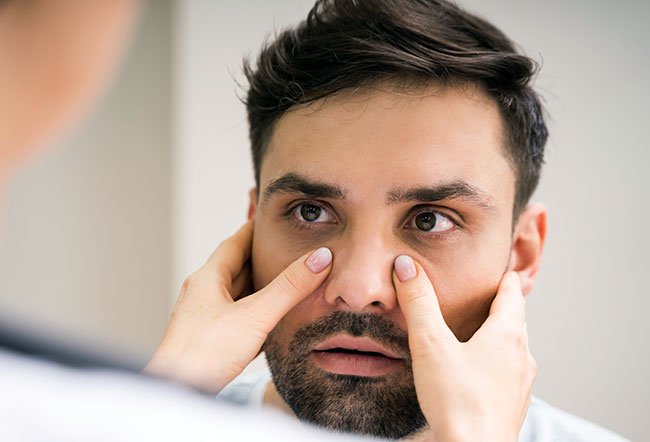How is frontal sinusitis treated?

The sinuses are cavities present in the facial bones. Frontal sinusitis is the swelling or infection of the frontal sinuses. The frontal sinuses are located just behind the eyes. All the sinuses produce mucus that drains into the nasal cavities. If the frontal sinuses are inflamed or infected, they cannot drain mucus efficiently, which causes congestion of the inner lining of the face and nose. Frontal sinusitis can be acute or chronic. In acute sinusitis, the symptoms last less than 12 weeks. In chronic sinusitis, the symptoms last longer than 12 weeks.
What causes frontal sinusitis?
The most common causes of frontal sinusitis are:
- Viral, bacterial, and fungal infections: Upper respiratory tract infection is a common cause of sinus infections.
- Allergies (allergic rhinosinusitis): Exposure to certain allergens, such as dust, pollen, and animal dander, can cause sneezing and itching, inflammation of the mucosal lining of the nose and sinuses, and accumulation of mucus. This can block the sinuses and prevent mucus draining.
- Deviated nasal septum: The nasal septum divides the nasal cavity into two parts. A deviated septum occurs when the nasal septum is displaced to one side making one nasal passage smaller. A deviated nasal septum can block the sinus openings, and the nasal passage becomes a problem when it regularly makes breathing difficult or causes other blockages. This increases the frequency of infections, such as frontal sinusitis.
- Nasal polyps: A poly is a soft, painless growth arising from the inner lining of the nose or sinuses. They may develop due to recurrent infections, allergies, chronic respiratory conditions, such as asthma. Polyps can block the nasal passage and drainage of mucus through the sinuses.
What are the signs and symptoms of frontal sinusitis?
The most common signs and symptoms of frontal sinusitis include:
- Nasal discharge
- Heaviness in the head
- A feeling of pressure behind the eyes
- Headache
- Tiredness
- Throat pain
- Blocked nose
- A reduced smell sensation
- Bad breath
- Fever in case of acute sinusitis
How is frontal sinusitis treated?
The most common signs and symptoms of frontal sinusitis include:
- Nasal discharge
- Heaviness in the head
- A feeling of pressure behind the eyes
- Headache
- Tiredness
- Throat pain
- Blocked nose
- A reduced smell sensation
- Bad breath
- Fever in case of acute sinusitis
How is frontal sinusitis treated?
Treatment options include:
- Over the counter (OTC) medication: OTC medications can provide quick symptomatic relief and help you recover faster. Saline nasal drops may be used four to five times a day to moisten the nose and mucus, helping clearance of mucus. Nasal decongestant drops containing oxymetazoline or xylometazoline may be used three to four times a day for up to a week to reduce inflammation in the nose, congestion, and clear the mucus. OTC antihistamine medication containing levocetirizine or fexofenadine may be taken, which can help reduce nasal discharge, congestion, and cough. Acetaminophen may be taken in case of fever, headache, and body pain every 4-6 hours. Antiseptic gargles containing iodine may be diluted with water (one spoon in half cup of warm water) and gargled thrice a day to soothe the throat. Steam inhalation may help too.
- Steroids nasal sprays: Steroid nasal sprays are usually prescribed by the doctor to help shrink polyps and reduce mucosal inflammation. This can help improve breathing.
- Antibiotics: Antibiotics may be prescribed in case of acute sinusitis.
- Oral steroids: Oral steroids may be prescribed to help shrink polyps.
- Surgery: Surgery may be performed if the patient develops chronic sinusitis and if conservative treatments fail. The surgery is called functional endoscopic sinus surgery (FESS). The surgeon uses an endoscope and specialized instruments to remove polyps and widen the sinus opening to remove the obstruction and facilitate drainage. A deviated septum is usually corrected in the same surgery.
Home remedies:
- Adequate hydration: Drinking plenty of fluids helps reduce nasal congestion and keeps the throat moist, making it easier for the mucus to clear out. Fluids can include water, juices, herbal teas, and soups.
- Plenty of rest, staying warm, and good nutrition: Rest, a nutritious diet, and keep yourself warm to enable the body to recover faster.
- Using steam: Inhaling steam can help clear out mucus from the nose and sinuses by reducing congestion. Steaming can be done by holding the head over a bowl of boiling water or a facial steamer for around 10 to 15 minutes and gently blowing out the nose after. Using a humidifier in your bedroom can also help keep the nose, throat, and mucus moist.
- Saltwater gargling: Gargling the water with warm salt water helps reduce throat pain and dryness of the throat. Half a teaspoon of salt can be dissolved in a cup of warm water and gargled up to four times a day.
- Drinking hot liquids: Hot liquids, such as soups, hot milk, and teas, can help reduce nasal congestion, soothe the throat, and reduce inflammation in the nose or throat.
- Using mentholated salve: Menthol, eucalyptus, and camphor all have mild numbing and decongestant ingredients dabbed over the head and nose that may help relieve the ache.
- Adding extra pillows: Adding extra pillows under the head while sleeping can help drain the nose and sinuses.
